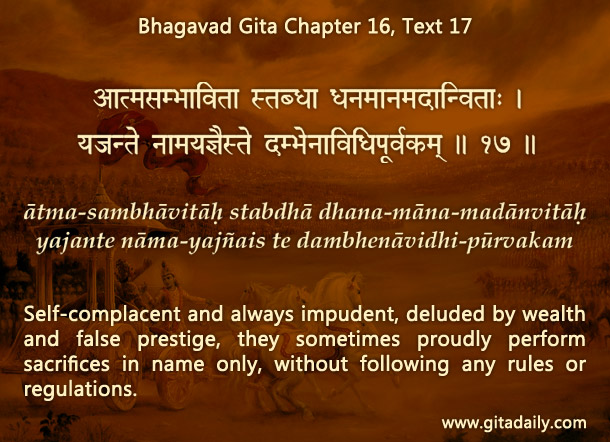Many people practice religion for cosmetic purposes – they want to look good in society’s eyes. They may visit temples on holy days, treating such visits as photo-ops, or may give charity, wanting their name-plaque displayed prominently. They make a show of religion to look good, the way people apply cosmetics.
However, religion is not meant to make us look good; it is meant to make us good. The Bhagavad-gita (16.17) reproaches ungodly people who do religious activities simply for show. As they are interested not in transformation or elevation of consciousness, but in exhibition, they don’t care whether they are following scripture. They may even change time-honored religious practices if the changed practices look better in society’s eyes. Just as cosmetics don’t change a person’s substance, neither does religion practiced cosmetically.
Significantly, religion’s purpose is not cosmetic, but cosmic – that is, it is meant to fulfill the cosmos’ ultimate purpose: discovering and relishing eternal ecstatic love. We all long to love and be loved. This longing can never be fulfilled at the material level because everything here is temporary. Only when we direct our heart towards an eternal object of love, God, Krishna, is our longing for love perennially fulfilled.
Srimad-Bhagavatam describes how the Lord was not satisfied even after creating various living beings, till he created human beings. Humans alone could practice religion, enquire into philosophy and realize their spiritual side.
Understanding this ultimate purpose of the cosmos, when we practice religion for connecting with Krishna, we access a sublime satisfaction that makes immoral indulgences resistible, even unappealing. By thus changing us for good, spiritual religion make redundant the need to look good.
When we thus practice religion for cosmic, not cosmetic, purposes, we experience a cosmic elevation of consciousness, from the world to Krishna for a life of eternal ecstatic love.
To know more about this verse, please click on the image
Explanation of article:
Podcast:


the purpose of religion is always realistic